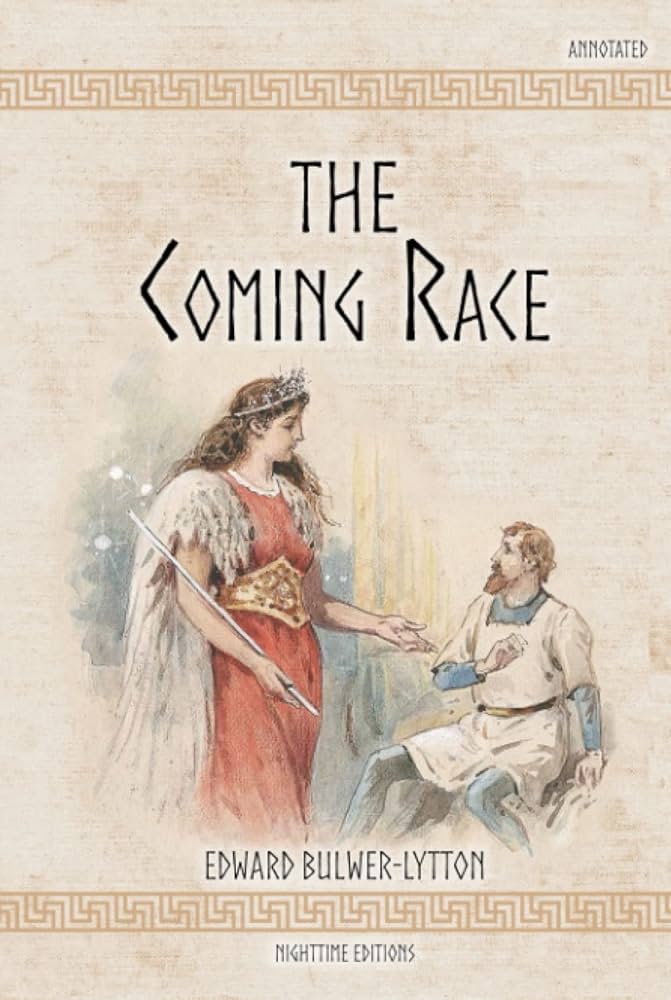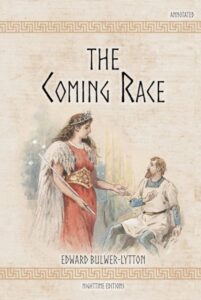Chapter XVI — The coming Race
byChapter XVI explores the awe-inspiring technological and physiological advancements of the Vril-ya, drawing particular attention to their ability to harness vril with a degree of mastery that renders our most destructive inventions obsolete. The narrator learns that the vril-powered instruments can obliterate a target hundreds of miles away with precision, all calculated through their sophisticated mathematical sciences. These calculations determine the charge and trajectory with such detail that entire cities could be erased in moments, should the Vril-ya ever choose to do so. Their destructive capability, while held in restraint by a strong moral framework, evokes a chilling sense of control. Power here is silent, precise, and absolute. It is not flaunted but rests like a sheathed blade, too sharp to test.
At the public museum housed within the College of Sages, the narrator is shown remnants of ancient technologies once revered by humanity—cannons, steam vehicles, and early aircraft—all now discarded as primitive relics. The Vril-ya view such inventions with amused disdain, relegating them to historical curiosity. Zee, with the composed confidence of her kind, gestures to these devices as markers of her people’s evolutionary journey from physical to mental and energetic mastery. She stands as a striking figure of this transformation—towering in stature, graceful yet formidable. The narrator watches in quiet dread as she manipulates heavy machinery at a distance using only her vril staff, animating metal with what seems to be pure will. Her presence is both elegant and terrifying.
The young Gy, Zee, explains that the human hand lacks the structural development needed to control vril effectively. Our thumbs are smaller, our palms coarser, and our nerves underdeveloped compared to the refined physiology of the Vril-ya. A visible nerve running beneath her skin reveals itself as a biological adaptation born over generations of vril use. She proposes that through focused effort, future generations of humans might develop similar abilities, but only after millennia of intentional evolution. Her reasoning is delivered with a mixture of scientific authority and serene superiority. The narrator, unable to refute her, remembers a fable about debating an emperor—realizing that argument against someone who possesses both force and logic is, at best, unwise.
When they arrive at a room dedicated to the archaeology of Vril-ya history, the narrator is struck by the vividness of portraits that are thousands of years old. Many display faces reminiscent of Renaissance art—marked by struggle, ambition, and emotional depth. These belong to an age before the discovery of vril had changed everything. As society became more peaceful and perfected, the expressions in the portraits shifted. The faces grew more serene, more beautiful, and yet more distant from human warmth. Alongside this visual evolution, the painter’s art itself became less dramatic—less inspired by inner turmoil, and more focused on external precision. With peace came stillness. With perfection, a kind of artistic decline.
The greatest curiosity in the gallery, however, is a trio of portraits that claim to trace the ancestry of the Vril-ya to a time before history. One is a philosopher, draped in armor of fish-like scales, with webbed hands and a broad, unusual face. The second and third—his grandfather and great-grandfather—appear increasingly amphibian. The last resembles a giant frog. A fable tied to these images proclaims: “Humble yourselves, my descendants; the father of your race was a tadpole.” The narrator laughs off the tale, but Aph-Lin insists it was once seriously debated during a period known as the Wrangling Age, about 7,000 years prior.
Philosophers then were sharply divided—some argued that the An evolved from frogs due to shared physical traits, internal structures, and a residual swimming bladder in the An’s anatomy. Others claimed the frog was actually a more advanced evolution of the An, citing its aquatic duality, smooth hairless skin, and social harmony. The arguments spilled beyond academia and fueled generations of war, finally culminating in the rise of a dynasty that claimed descent from a tadpole. With the arrival of vril, such disputes faded, and the age of violent wrangling ended. Now, only children find amusement in these tales.
Zee reflects on this philosophical turmoil with clarity. She suggests that the form doesn’t matter—what matters is the divine capacity granted to the An: the gift to understand creation, recognize beauty, and aspire toward truth. That intellectual spark, not the structure of the hand or the texture of the skin, defines humanity. She says that no matter how advanced the An becomes, they will never be able to recreate that divine beginning. Her logic, paired with Aph-Lin’s approval, leaves the narrator silent. Not because he agrees entirely—but because he senses, more than ever, the quiet authority of a race that left conflict behind and replaced it with contemplation.


